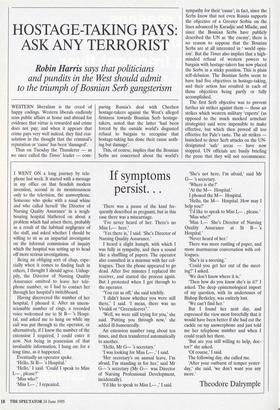If symptoms persist.. .
I WENT ON a long journey by tele- phone last week. It started with a message in my office on that fiendish modern invention, second in its monstrousness only to the television, the answerphone. Someone who spoke with a nasal whine and who called herself 'the Director of Nursing Quality Assurance' in a neigh- bouring hospital blathered on about a problem which had arisen there, probably as a result of the habitual negligence of the staff, and asked whether I should be willing to sit as an impartial investigator on the informal commission of inquiry which the hospital was setting up to head off more serious investigations.
Being an obliging sort of chap, espe- cially when it comes to finding fault in others, I thought I should agree. Unhap- pily, the Director of Nursing Quality Assurance omitted to leave her tele- phone number, so I had to contact her through her hospital's switchboard.
Having discovered the number of her hospital, I phoned it. After an uncon- scionable number of rings, a recorded voice welcomed me to St B— 's Hospi- tal, and asked me to hang on while my call was put through to the operator, or alternatively, if I knew the number of the extension I required, I could enter it now. Not being in possession of that invaluable information, I hung on: for a long time, as it happened.
Eventually an operator spoke.
`Hello, St B— 's Hospital.'
`Hello,' I said. 'Could I speak to Miss L— , please?'
`Miss who?'
`Miss L— I repeated. There was a pause of the kind fre- quently described as pregnant, but in this case there was a miscarriage.
`I've never heard of her. There's no Miss L— here.'
`Yes there is,' I said. 'She's Director of Nursing Quality Assurance.'
I heard a slight humph, with which I was fully in sympathy, and then a sound like a shuffling of papers. The operator also consulted in a murmur with her col- leagues. Then the phone appeared to go dead. After five minutes I replaced the receiver, and started the process again. But I protested when I got through to the operator.
`You cut us off,' she said tetchily.
`I didn't know whether you were still there,' I said. 'I mean, there was no Vivaldi or "Greensleeves".'
`Well, we were still trying for you,' she said. 'Putting you through now,' she added ill-humouredly.
An extension number rang about ten times, and then transferred automatically to another.
`Hello, Mr G— 's secretary.'
`I was looking for Miss L— I said.
`Her secretary's on annual leave, I'm afraid, I'm standing in for her,' said Mr G— 's secretary (Mr G— was Director of Nursing Professional Development, incidentally).
`I'd like to speak to Miss L— I said. `She's not here, I'm afraid,' said Mr G— 's secretary.
`Where is she?'
`At the M— Hospital.'
I phoned the M— Hospital.
`Hello, the M— Hospital. How may I help you?'
`I'd like to speak to Miss L— , please.' `Miss who?'
`Miss L— She's Director of Nursing Quality Assurance at St B— 's Hospital.'
`Never heard of her.'
There was more rustling of paper, and more murmurous conversation with col- leagues.
`She's in a meeting.'
`Could you get her out of the meet- ing?' I asked.
`We don't know where it is.'
`Then how do you know she's in it?' I asked. The deep epistemological import of my question, with its undertones of Bishop Berkeley, was entirely lost.
`We can't find her.'
But I found her next day, and expressed the view most forcefully that it would have been better if she had cut the cackle on my answerphone and just told me her telephone number and when I could reach her there.
`But are you still willing to help, doc- tor?' she asked.
`Of course,' I said.
The following day, she called me.
`After your outburst of temper yester- day,' she said, 'we don't want you any more.'
Theodore Dalrymple


























































 Previous page
Previous page